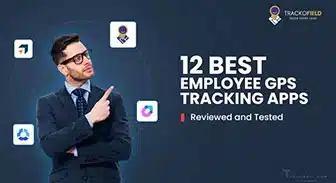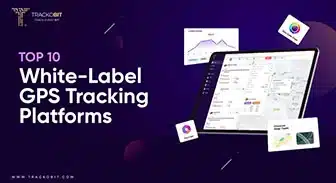-
TrackoBit
Manage commercial vehicles with the new-age Fleet Management Software
TrackoBit -
TrackoField
Streamline your scattered workforce with Field Force Management Software
TrackoField -
Features Resources
-
Blog
Carefully curated articles to update you on industrial trends. -
White Paper
Insightful papers and analysis on essential subject matters. -
Glossary
Explore an alphabetical list of relevant industry terms. -
What’s New
Get TrackoBit & TrackoField monthly updates here. -
Case Study
Explore the cases we solved with our diverse solutions. -
Comparisons
Compare platforms, features, and pricing to find your best fit.
-
About Us
Get to know TrackoBit: our team, ethos, values, and vision. -
Careers
Join the most dynamic cult of coders, creatives and changemakers. -
Tech Support
Learn about our technical support team and services in detail. -
Events
Check out the exhibitions where we left our marks and conquered. -
Contact Us
Connect with us and let us know how we can be of service.
What is Location Based Tracking? How it Works? Its Applications
- Author:Nandita Gupta
- Read Time:
- Published:
- Last Update: August 27, 2025
Table of Contents
Toggle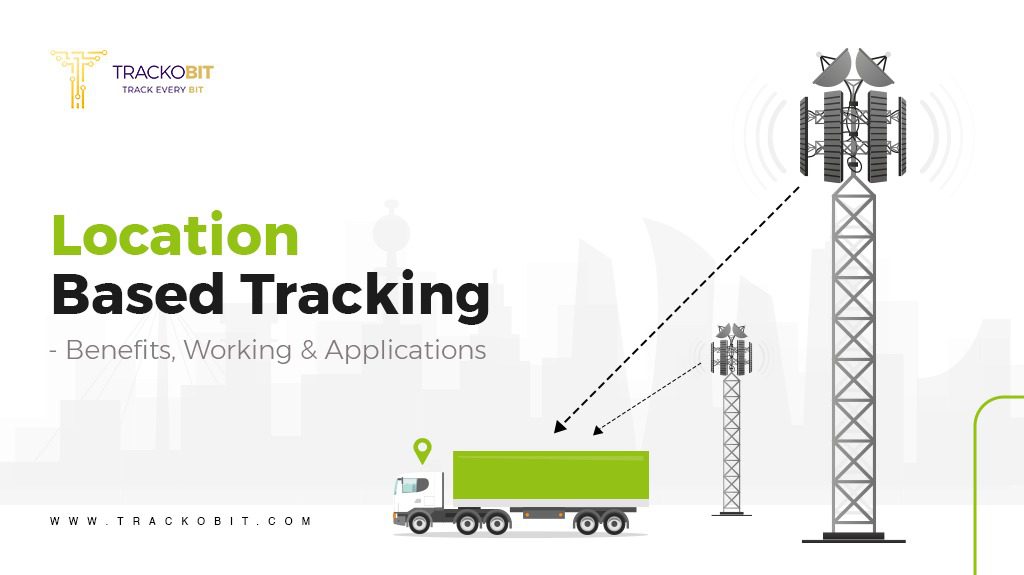
Discover how real-time location based tracking enhances a business’s operational efficiency in fleet management, targeted marketing, and customer experiences. Is it as precise as GPS tracking? Let’s find out!
Table of Contents
Toggle
Imagine a world where:
Travelers never find the fastest route
.
.
Consignment trucks take long de-tours
.
.
Or emergency services struggle to show up on time.
Location based services or tracking has transformed these scenarios by leaps & bounds. For delivery or service businesses, location data tracking has unlocked efficiency, personalisation, and growth.
From enabling efficient route navigation and personalized marketing services to seamless resource allocation, location tracking services uplift business operations & productivity across the universal sectors.
What is Location Based Tracking?
Location-based tracking (LBS tracking) helps track users’ physical and geographical location but without the use of traditional GPS or Galileo (global navigation satellite system). Location based technology is commonly used with mobile devices but can be used with PCs as well.
Many Android and iOS applications today leverage location based services, where these applications extract users device’s current geographical location. The perfect example of this service would be — apps like Google Maps that lets you find nearby restaurants, petrol pumps, or stores, by identifying your current location.
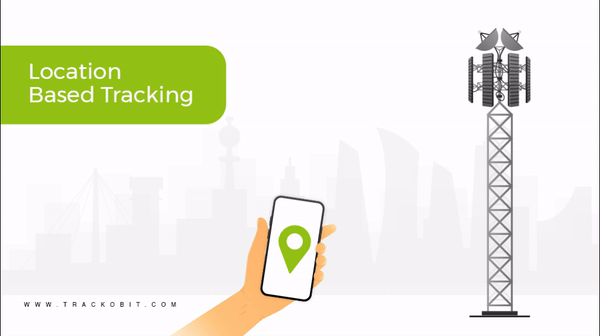
What are the Benefits of Location-Based Services?
From personalized navigational experiences and efficient resource allocation to enhanced safety measures, here’s how location based tracking benefits industries.
1. Navigation & Mapping
Location tracking is leveraged in GPS navigation and digital mapping apps. Helps users find directions or points of interest, and explore unfamiliar areas.
2. Fleet Management
With locational tracking, fleet management businesses optimize routes, reduce fuel consumption, monitor driver behavior, and improve overall efficiency.
3. Asset Tracking
Useful for companies looking to track and manage their valuable assets such as equipment, inventory, and shipments. It helps prevent asset loss, theft, or vandalising.
4. Supply Chain Optimization
Tracks the movement of goods from manufacturers to retailers and everywhere else in between. It helps in optimising supply chain logistics. This further helps in minimising delays and ensuring timely deliveries.
5. Data Analytics and Insights
Location data coupled with operational data helps with customer segmentation and further gives insights into understanding customer behavior, mobility patterns, and other trends. All this data helps businesses and researchers make better decisions.
6. Personal Safety
Nowadays wearable devices with location tracking capabilities help track individuals or kids. Such tracking allows individuals to share locations and receive assistance if there is any threat around.
| 💡 Words of Wisdom: With location-based tracking, it’s important to responsibly and ethically leverage user data by keeping individual privacy rights at the forefront. |
How Does LBS or Location-based Tracking Work?
Location based tracking software relies on various technologies, data processing, and software interfaces to determine and utilize a device’s or user’s geographical position.
Here’s how location-based tracking works:
1. Use of Location-identifying Technologies
LBS tracking software leverages the following technologies to track down the real-time location of a device’s or user’s location:
a) Wi-Fi
Location tracking with Wi-Fi is quite different from other methods. Here, a device connects only to one Wi-Fi network at a time, to avoid triangulation. Every network has a different physical IP address, Wi-Fi uses that to track the required user or device’s location.
Whenever a user’s phone connects to a Wi-Fi network, it gets automatically paired to a physical IP address, which lets location services view the current location.
b) Cellular Technology
Cellular tracking works just like GPS tracking would. However, it’s different from GPS tracking as instead of connecting to satellites, the mobile device connects to cellular towers. Whenever the user or his/her device is in the range of at least two towers, the services use triangulation to find your location.
c) QR Codes
Quick-response (QR) tracking works just like Wi-Fi. Whenever a dynamic QR code is scanned, it logs all the information about the physical place of the scan. You can create your QR codes with this free QR code generator.
d) RFID Technology
Here the location of the device used for accessing RFID scanners is considered for location tracking. It helps best with tracking your physical inventory’s location or employee monitoring.
2. Data Collection and Processing
The location tracking software collects real-time locational data through the above-mentioned technological outputs. The collected data generally includes Wi-Fi, cell tower signals, or sensor readings. The gathered raw data is further processed by the location tracking services software to interpret the right location coordinates.
3. Triangulation and Trilateration
The above technologies determine the location of the device or a person through triangulation or trilateration:
- Triangulation – Here technologies use angle points between GPS satellites to evaluate the device’s location.
- Trilateration – This method evaluates the device’s location based on the distances of known points like Wi-Fi access points or cell towers.
4. Location Services and APIs
Operating systems and applications with location services leverage geolocation APIs to programmatically access the location functionality.
5. User Consent and Privacy
Location tracking starts working whenever a user gives consent to its network operator. Users have every right to allow or reject location tracking services apps from accessing their location data. You will notice that many LBS tracking software or apps today offer the option to access location only while using certain apps (running in the foreground or background)
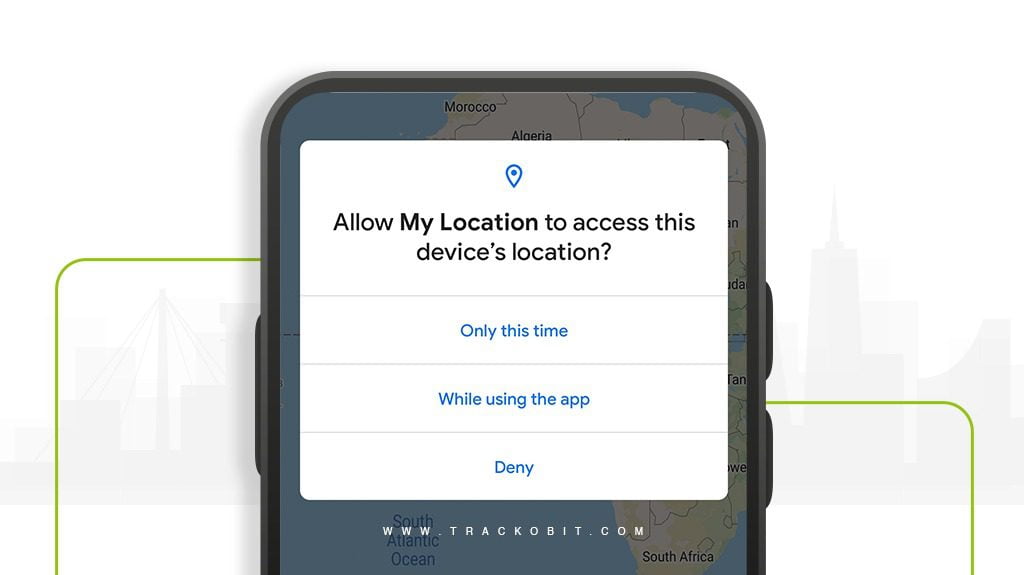
Difference Between GPS Tracking and Location-Based Tracking
“GPS tracking” and “location based tracking” by definition can appear identical or interchangeable, but they aren’t. Both terms essentially refer to the process of tracking and determining the geographical position of objects, people, or devices.
Location based tracking software leverages cellular network infrastructure to calculate location based on cell tower proximity. Whereas, GPS tracking depends on satellite signals to provide precise global positioning information. The choice between GPS Vs LBS depends highly on the desired accuracy, use case, installation costs, and the tracking environment.
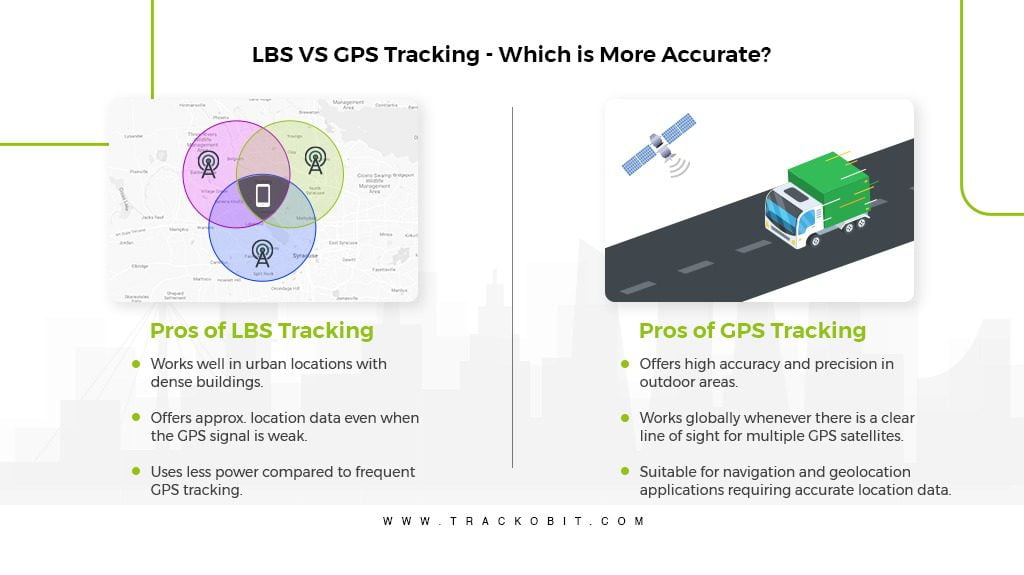
GPS Vs LBS – Shortcomings!
|
Cons of LBS Tracking |
Cons of GPS Tracking |
|
|
Inarguably, between GPS VS LBS, GPS tracking is a more trusted choice as it offers more accuracy and can operate in any tracking environment.
Application of Location-Based Tracking – Popular Use Cases
Location-based tracking is applicable in a wide range of domains, right from fitness tracking to fleet management. Here are a few use cases suggesting how location based services serve multitudes of industries.
|
Industries |
Use Cases |
| Fitness and Health Monitoring | Location based tracking in fitness apps helps:
|
| Marketing and Personalization | In marketing, location-based data is useful for:
|
| Crime Prevention and Law Enforcement | Law enforcement agencies can use location tracking to:
|
| Tourism and Hospitality | Location-based services help enhance the tourist experience by providing information about nearby attractions, restaurants, or cultural landmarks. |
| Weather Forecasting | Weather agencies use location data:
|
| Disaster Response and Recovery | During natural disasters, location tracking helps:
|
| Urban Planning and Infrastructure Development | City planners can use location data:
|
| Environmental Monitoring | Location tracking is also useful in monitoring:
|
| Emergency Services | Location tracking assists emergency services:
|
| Geotagging and Social Media |
Suitable for users:
|
Location based tracking also streamlines mobile workforce management. LBS lets managers check their remote employees’ real-time movement to ensure workers are at or around the destined location.
Who Uses Location Based Services?
Location based tracking is useful for:
- Businesses that want to optimise their deliveries.
- Parents who want to monitor their children or elders.
- Travellers exploring or navigating new places.
- Marketers unraveling customer buying behaviour.
- Data analysts who want to study mobility patterns.
What are the Disadvantages of Location Based Services?
There is no doubt location based tracking has simplified users’ navigation, but it still has some challenges that require users’ attention:
- Data Accuracy Issues
Location accuracy differs according to the Wi-Fi density, cell tower coverage, and other environmental conditions. Indoor environments or densely populated urban areas might not receive accurate locational data. Any interference in signals can mess up with correct directions or recommendations.
- Privacy Concerns
These services collect and store user location data, which if mishandled or exposed to malicious parties, can lead to data breaches or physical risks.
- Heavy Battery Usage
LBS is reliant on smartphone batteries. Too much use of such services can exhaust battery power pretty fast; leaving users stranded when battery backup isn’t a thing.
- Subscription Costs
GPS was developed by the U.S. military and is free for anyone to use. However, sim-based or cellular tracking demands subscription costs, compared to GPS ones.
The above drawbacks of LBS tracking necessitate careful consideration of safety protocols and users’ consent while designing a custom LBS tracking system.
Wrapping Up!
From turn-by-turn navigation for fleet management to augmented reality experiences in smartphone apps, location based tracking has ushered in a new era of personalisation, convenience, and connectivity.
Location based services are now available in uncanny apps and systems. They are a super choice for businesses that want to optimize assets and enhance operational efficiency and customer experiences. This quick, easy, and affordable tracking method is a go-to choice when GPS device installations aren’t a priority.
How about our consultants get you a free demo of affordable Location based tracking software with GPS support that you can use without installing a device or paying for its maintenance?
Frequently Asked Questions on Location Based Tracking
-
What are location based services?
A location based service or LBS is a software service that leverages users’ device’s geographic data to provide services. For example, an LBS tracking system is used in apps for finding restaurants, petrol pumps, or stores nearby.
-
Which apps use location based services?
Apps like Google Maps, Waze, Uber, Lyft, Uber, WhatsApp, and GasBuddy use location based services to offer personalised experiences.
-
What is the purpose of location based services?
The purpose of location based services is to provide precise locational insights for either fleet management or making personalised recommendations for improving customer experiences.
-
How does location-based tracking help fleet management?
Location-based tracking or LBS tracking system is suitable for vehicle or consignment tracking where installation of GPS trackers is not a preference. Suitable for vehicles that are rented or hired on an ad-hoc basis.
Nandita is the Team Lead for Content Marketing at TrackoBit, bringing over a decade of experience in B2B, B2C, and IoT sectors. She has a proven track record of helping Read More
Related Blogs
-
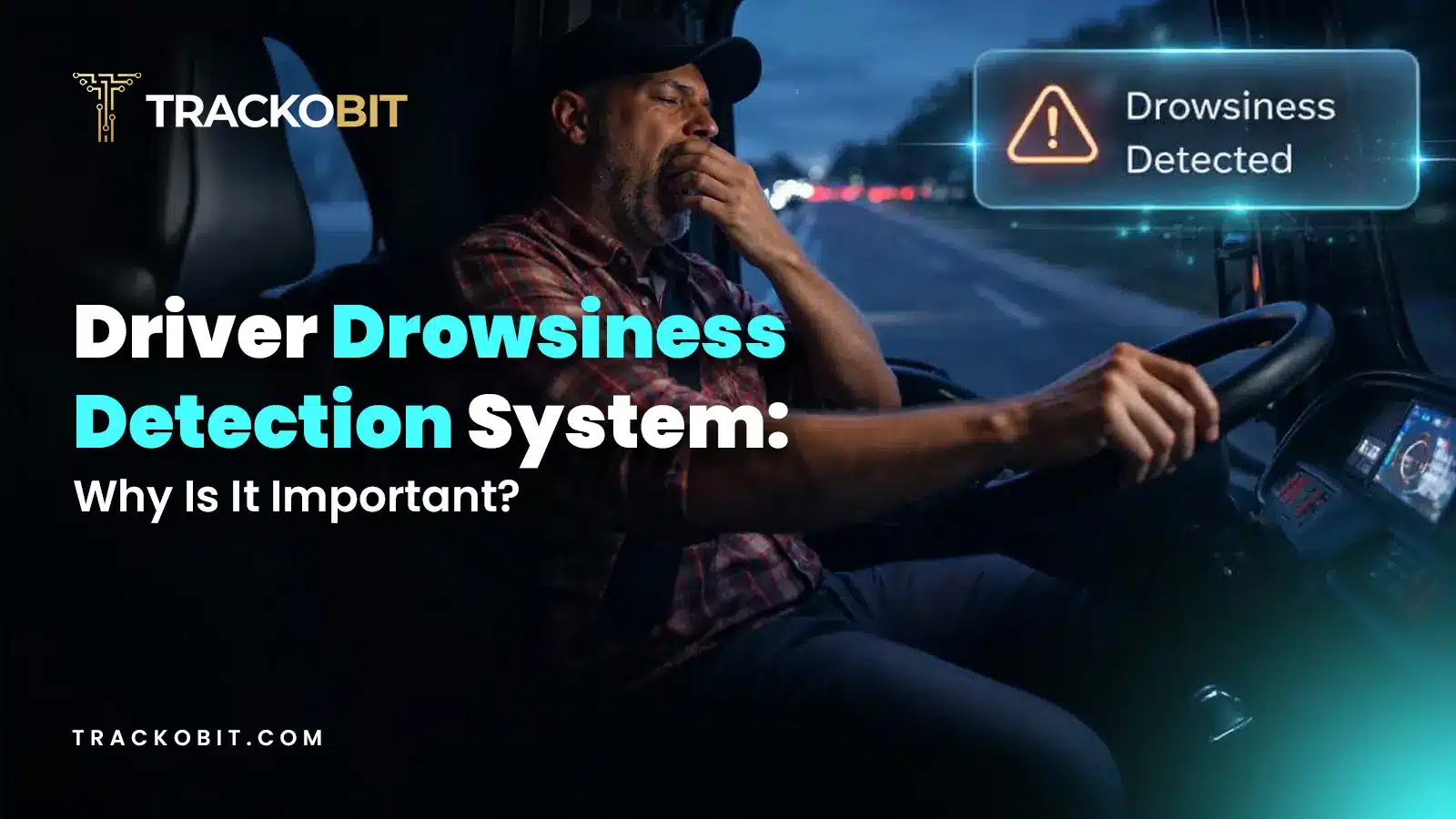
Why is Driver Drowsiness Detection System Important for Fleet Management?
Shemanti Ghosh February 4, 2026A driver drowsiness detection system is critical for fleet management. It helps prevent fatigue-related accidents and reduces operational risks through…
-
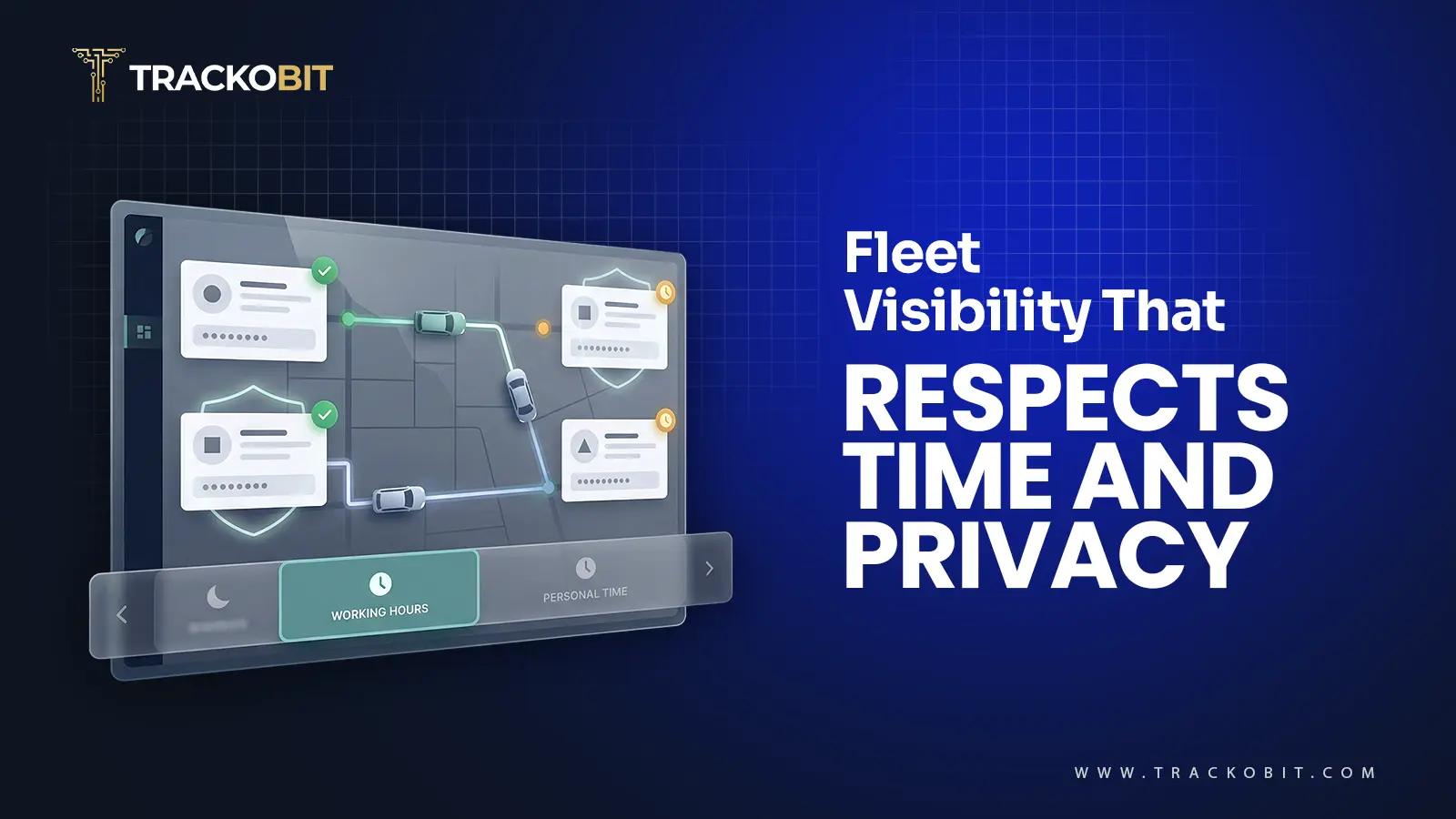
When Tracking Needs a Clock: Rethinking Fleet Visibility
Tithi Agarwal December 24, 2025Read on to understand why fleet tracking works better when it follows working hours. Because visibility should support operations, not…
-
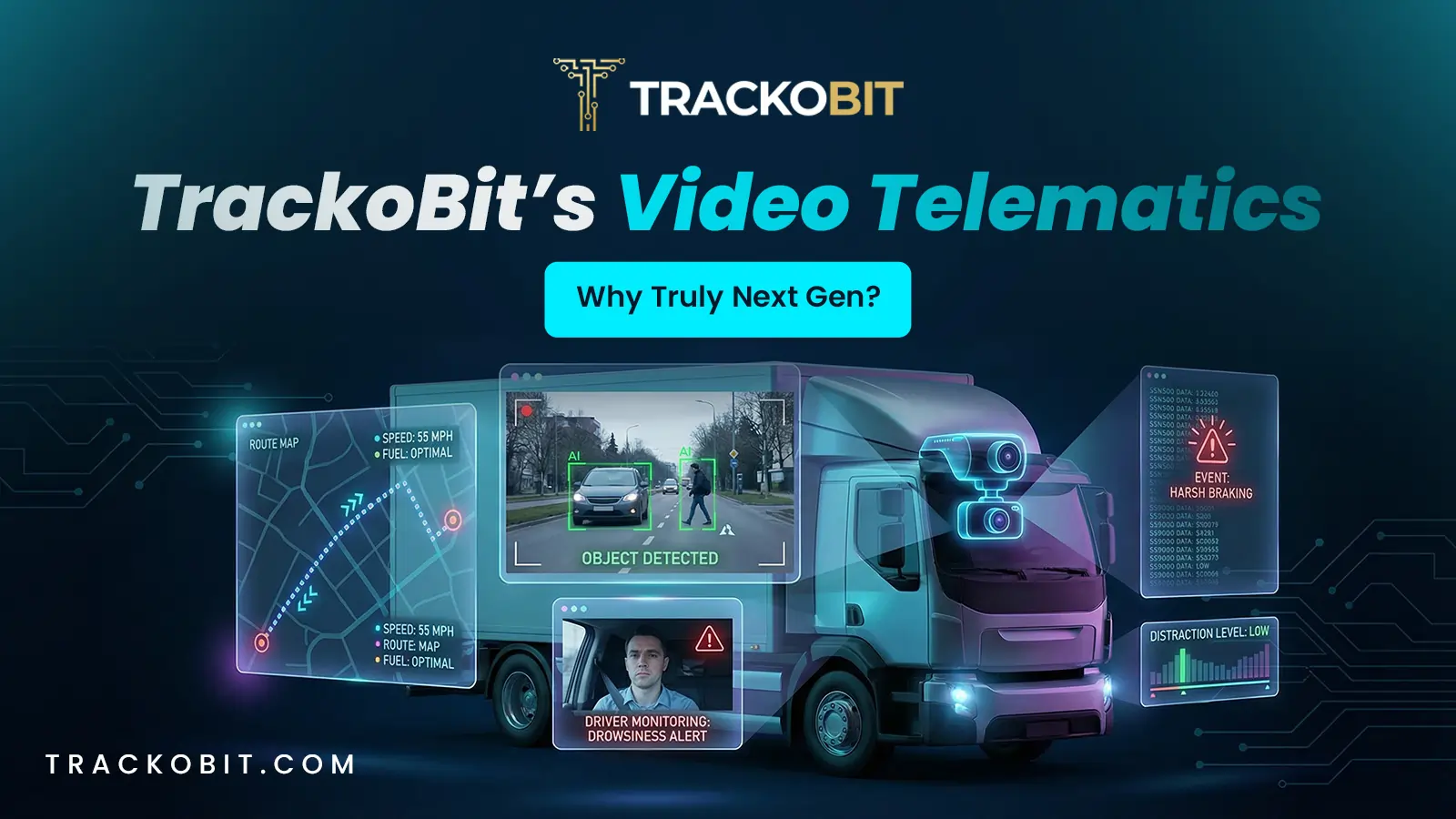
What Makes TrackoBit’s Video Telematics Software Truly Next-Gen?
Shemanti Ghosh December 17, 2025TrackoBit’s video telematics software blends smart video intelligence with full server control. The result? Superior fleet reliability and safety.
-
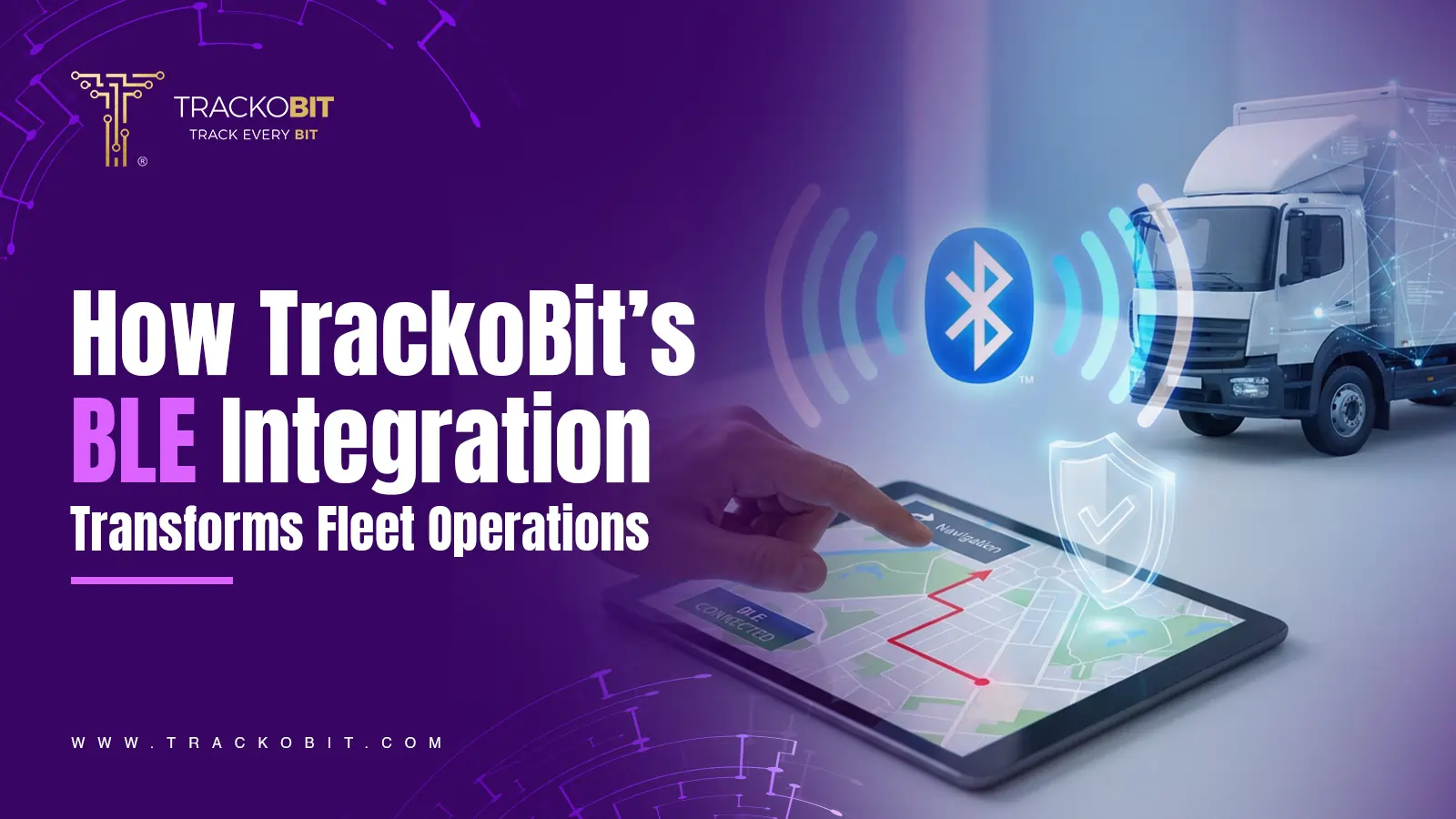
Plug, Pair, Perform TrackoBit Introduces BLE Sensor Integration
Tithi Agarwal November 26, 2025TrackoBit’s BLE Sensor Integration enables wireless, real-time monitoring with faster installs and accurate insights. It improves fleet efficiency, visibility, and…

Subscribe for weekly tips to optimize your fleet’s potential!
Your inbox awaits a welcome email. Stay tuned for the latest blog updates & expert insights.
"While you're here, dive into some more reads or grab quick bites from our social platforms!"Stay Updated on tech, telematics and mobility. Don't miss out on the latest in the industry.
We use cookies to enhance and personalize your browsing experience. By continuing to use our website, you agree to our Privacy Policy.


































